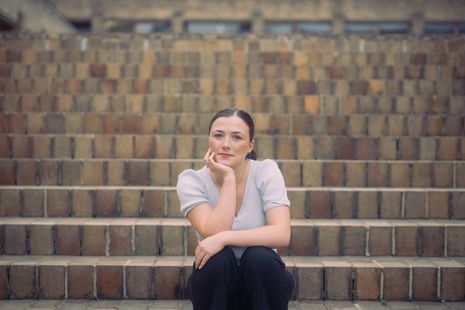Watersprite Director Maddy Gordon-Finlayson on the urgent need for creativity
Amanda Ljungberg interiews Maddy Gordon-Finlayson, director of the Watersprite Film Festival, on her work supporting underprivileged filmmakers

Watersprite, the world’s largest student film festival, is not an unfamiliar name to anyone even peripherally engaged with the Cambridge creative scene. Maddy Gordon-Finlayson, the Watersprite Film Festival Director for 2026, puts it simply for me: they are a global community of filmmakers, and people who care about filmmaking, connected by a conviction that filmmaking is, and can be, for everybody.
Somewhat surprisingly, this is Maddy’s first year on the committee. You would never expect it from how passionately and confidently she speaks. Although she is daunted to be “throwing herself in the deep end,” she believes it is useful to bring a fresh pair of eyes to the 17-year old festival. I ask her what she is bringing specifically and am given, enticingly, the hint of something “exciting” that she is pitching to the trustees.
Watersprite is run for emerging creatives, by emerging creatives. Asked what she attributes the festival’s long-standing success to, Maddy states that the committee “[has] its finger on the pulse of what young people need right now,” which she believes people are “receptive to”. I can attest to this: I volunteered at Watersprite myself last year and found it a genuinely exciting and enriching experience.
Filmmaking is technically more accessible than ever. The issue, however, is a lack of knowledge about that accessibility. Maddy questions the narrative that creative jobs are not financially viable (familiar ground for a humanities student). “The world will always need creatives, always need filmmakers,” she tells me. “Film is one of the few ways people can express themselves and what matters.” She points to the success of Netflix’s Adolescence as having generated more conversation about youth culture and the rift caused by technology than policymakers have for the past decade. “Good art brings people together,” she says: filmmaking “has the potential to be accessible and universal”.
“The world will always need creatives, always need filmmakers”
Her interest and experience working in social policy, as well as ethical leadership training under the Cambridge Laidlaw Scholarship, moved her to use her talent to “do good for other people”. She would never have done this at the beginning of her time at Cambridge, she says; indeed for a History student it seems impressively ambitious to be setting time aside for such a large-scale endeavour, not explicitly related to her degree. Nonetheless, Maddy tells me that everything – her degree, her social work, Watersprite – is “linked… [it’s] all about communicating stories, arguments, stimulating debate and discussion”. Does her committee share this position? “If you really love it and it’s your passion, it doesn’t feel like work,” she assures me. “The whole team feels a sense of community and responsibility for delivering something that’s in the real world.”
Accordingly, Maddy reiterates throughout our discussion the political stakes of film, naming Watersprite a point where “creative talent and social justice intersect”. Should film ever be limited to sending a message? “What we do is inherently political because we are trying to reach disadvantaged filmmakers,”Maddy says. “The world looks different to when Watersprite started.” To jump the “hurdles” of AI, economic hardship and political oppression, “[we need to] show filmmakers that their talent is necessary and needed right now”.
“[We need to] show filmmakers that their talent is necessary and needed right now”
Students not introduced to film through their school curriculums must be inspired by other means. Throughout the year, Watersprite’s Creative Futures Team runs screenings for secondary school students in the Cambridgeshire area. A new development this year is the ‘Manchester Hubs’ program, a weekend workshop in November for vocational college students and those who come to film later in life, sponsored by the Victoria Wood Foundation. Alongside this, the team has the mammoth task each year of sending out thousands of emails to film schools, clubs, and networks across the world to encourage submissions.
All nominated filmmakers are invited to attend the festival in-person, with generous bursaries given towards their travel expenses and accommodation (the festival sponsor that has covered this most recently was Amazon MGM Studios). Across the festival weekend, attendees are free to sit in on talks and panels by exciting guests, previously including Olivia Colman and Eddie Redmayne. But how does Watersprite keep incentivising young, underprivileged creatives to produce art? Maddy says they offer a “diverse range” of prizes, including camera equipment, mentorships, and coffee chats with industry professionals. Watersprite aims to “help nominees boost their careers,” with alumni going on to win awards at the BAFTAs, Sundance, and Cannes Film Festivals.
The matter of financial accessibility, keeping the festival free for all, is one that Maddy defends adamantly. She thanks the sponsors of the festival, as well as festival chair Hilary Bevan Jones, to whose 17 years of leadership the team owes much of its continued success.
What I want to know most, before we concluded our discussion, is what fighting chance Watersprite has in a culture increasingly devaluing creative work. A rather disheartening memory lingering over our talk is that of urging passers-by to drop in to guest talks and workshops. Despite Watersprite’s hugely impressive global reach, and a record number of submissions this year (2,234 from 108 countries), Watersprite is, as Maddy admits, Cambridge’s “best kept secret”.
The committee is trying to change that. Increasing its social media presence can, however, seem like a swing against a larger, darker sociopolitical shift which has not passed higher education by. In the UK, Maddy tells me, creative subjects seem more adjacent than integral to public school education: “Even if you aren’t creative … it’s important to have access to creative tools to express [yourself].” Maddy asserts that their aim is “demystify the idea that you can’t have a job in the creative industry unless you know somebody”. Watersprite does not go in “search” of particular voices or stories: “We just want to elevate talent … to show that filmmaking with an ethical mission is not only essential but award-winning.”
“Filmmaking with an ethical mission is not only essential but award-winning”
I agree that it is our responsibility, whether or not we are creatives ourselves, to celebrate the work that Watersprite is doing, to, as Maddy articulates, “educate and inspire the next generation of talent”. Even without joining the committee, Watersprite welcomes volunteer judges (“a fun job: just watch films and rate them”), as well as on-site volunteers to organise and coordinate the events over the festival weekend. Of course, the talks and screenings are also free for all to attend.
“It is important to be positive about the future of film and creative industries,” Maddy says. “You can look to our alumni filmmakers to find out how to do that: we’ve had documentary makers produce amazing pieces of work under very repressive political regimes; we’ve had animations made on an iPhone. Talent always wins out. We must elevate that talent.”
Submissions are currently closed for this year’s festival, but the Watersprite team regularly updates their social media and website with steps on how to get involved. The task of democratising the film industry is behemoth, but Watersprite might be one of the best places to start.
 News / Judge Business School advisor resigns over Epstein and Andrew links18 February 2026
News / Judge Business School advisor resigns over Epstein and Andrew links18 February 2026 News / Gov grants £36m to Cambridge supercomputer17 February 2026
News / Gov grants £36m to Cambridge supercomputer17 February 2026 News / Union speakers condemn ‘hateful’ Katie Hopkins speech14 February 2026
News / Union speakers condemn ‘hateful’ Katie Hopkins speech14 February 2026 News / CUCA members attend Reform rally in London20 February 2026
News / CUCA members attend Reform rally in London20 February 2026 News / Hundreds of Cambridge academics demand vote on fate of vet course20 February 2026
News / Hundreds of Cambridge academics demand vote on fate of vet course20 February 2026










